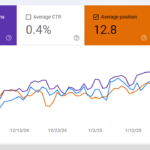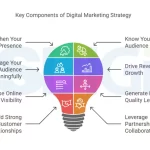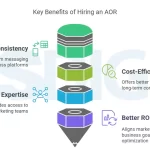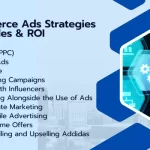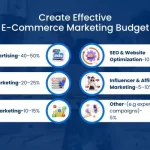
In today’s digital world, every company, particularly ecommerce websites, must have an online presence. With increased competition in the online marketplace, it is essential to optimize your ecommerce website for search engines in order to assure exposure and attract new clients. We understand the importance of search engine optimization (SEO) in improving your online exposure. We will lead you through the important stages for optimizing your ecommerce website for SEO success in this blog.
1. Keyword Research: The Foundation of SEO
The first stage in improving your ecommerce website is doing extensive keyword research. Determine relevant keywords and phrases that prospective buyers may use to search for comparable items or services to yours.
Use keyword research tools to identify high-volume, low-competition terms that are relevant to your target audience. Include these keywords in your product descriptions, meta titles, and meta descriptions in a natural way.
2. Optimizing On-Page SEO Elements

Title Tags and Meta Descriptions
Create appealing title tags and meta descriptions that are keyword-rich for each product page. These parts act as your website’s introduction in search engine results pages (SERPs). Engaging meta descriptions may considerably enhance click-through rates, resulting in higher traffic.
Read For More Information – How we Optimize SEO Strategy for Your Specific Business?
Unique Product Descriptions
Create distinct and interesting product descriptions for each item in your inventory to avoid duplication information. High-quality, unique content not only appeals to search engines but also delivers value to prospective consumers, raising conversion rates.
Optimized Images
Make product photographs more appealing by utilizing descriptive file names and alt tags. These features are used by search engines to interpret the content of photographs. Compress photos without sacrificing quality in order to achieve quick loading speeds, which are important for SEO and user experience.
3. User Experience and Website Design

Mobile-Friendly Design
Check that your ecommerce website is mobile-friendly. With a growing number of consumers accessing the internet via smartphones and tablets, mobile responsiveness is an important ranking criterion that should not be overlooked.
A seamless mobile experience enhances user satisfaction and improves your website’s SEO performance.
Intuitive Navigation
Create a user-friendly navigation framework. Well-organized categories and subcategories make it simple for visitors to discover items fast. Implement breadcrumb navigation to improve user experience and assist search engines in understanding the hierarchical structure of your website.
4. Technical SEO: Enhancing Website Performance

Page Loading Speed
Page loading speed directly impacts user experience and search rankings. Optimize your website’s loading speed by minimizing CSS and JavaScript files, leveraging browser caching, and choosing a reliable hosting provider.
Consider using Content Delivery Networks (CDNs) to distribute content geographically and reduce server response times.
XML Sitemap and Robots.txt
Create an XML sitemap and robots.txt file for your website. Submit the sitemap to search engines to ensure all pages are indexed properly.
Robots.txt helps search engine bots understand which pages to crawl and index, preventing them from accessing irrelevant or sensitive information.
5. Off-Page SEO: Building Authority and Credibility

Link Building
Create a link-building plan to boost the authority of your website. Seek high-quality backlinks from credible industry websites. Guest blogging, influencer collaborations, and social media marketing may all help you get useful backlinks, increasing your website’s trustworthiness in the eyes of search engines.
Social Media Presence
Maintain an active presence on social media. Engage your audience, contribute great material, and market your products/services. Social signals such as likes, shares, and comments impact search results indirectly by suggesting user participation and trustworthiness.
Conclusion
Optimizing ecommerce website for SEO is a continuous effort that demands commitment and attention to detail. By applying the tactics described above, we, at AMSDigital technology & media services, provide top class website development and SEO services to improve your website’s exposure, attract organic visitors, and eventually boost revenue. Stay updated with the latest SEO trends and algorithm changes to adapt your strategies accordingly.
Contact us Now to schedule a meeting about your next project or write to us at sales@amsdigital.in with your detailed scope of work.

